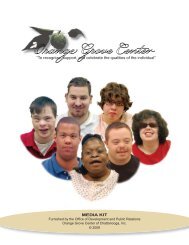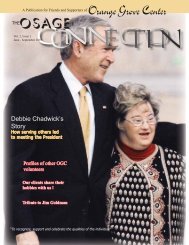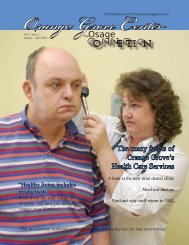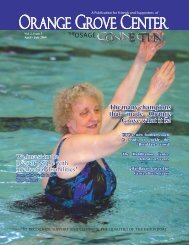tyber building fund brochure.indd - Orange Grove Center
tyber building fund brochure.indd - Orange Grove Center
tyber building fund brochure.indd - Orange Grove Center
You also want an ePaper? Increase the reach of your titles
YUMPU automatically turns print PDFs into web optimized ePapers that Google loves.
<strong>Orange</strong> <strong>Grove</strong> <strong>Center</strong><br />
Today<br />
O<br />
range <strong>Grove</strong> <strong>Center</strong> in Chattanooga, TN, has<br />
been offering services to those with intellectual<br />
and developmental disabilities for over 50 years. From its<br />
humble beginnings in 1953 as a four-room schoolhouse,<br />
the <strong>Orange</strong> <strong>Grove</strong> <strong>Center</strong> is now one of the country’s<br />
stellar service providers, meeting needs in the arena of<br />
children’s’ education programs, adult vocational training,<br />
medical and dental care, residential services and therapy,<br />
habilitation, and nutrition services for over 700 individuals.<br />
Visionaries<br />
Isidore and Betty Tyber<br />
circa 1976<br />
When a discussion of <strong>Orange</strong> <strong>Grove</strong> <strong>Center</strong>’s founding<br />
fathers and mothers arises, the late Isidore and Betty<br />
Tyber loom large as visionaries who were determined to<br />
create a better world, full of possibility, for their son with<br />
intellectual disabilities.<br />
O R A N G E G R O V E C E N T E R<br />
<strong>Orange</strong> <strong>Grove</strong> <strong>Center</strong><br />
615 Derby Street<br />
Chattanooga, TN 37404<br />
The<br />
<br />
Fund<br />
The Need<br />
“Years of service and functionality have left the Tyber<br />
Building in need of a face-lift to enhance the aesthetic<br />
appearance of the <strong>building</strong>. A technological overhaul to<br />
replace antiquated equipment is also a real area of need. A<br />
<strong>fund</strong>raising campaign to meet these objectives will go a long<br />
way in assisting <strong>Orange</strong> <strong>Grove</strong> <strong>Center</strong> to continue its mission<br />
of “recognizing, supporting and celebrating the qualities”<br />
of the individuals served by OGC’s many programs. It will<br />
also fi ttingly memorialize and honor the life of my brother,<br />
Jackie, who was served by <strong>Orange</strong> <strong>Grove</strong> for many years<br />
as well as my mother and father, Betty and Isidore Tyber,<br />
for whom the <strong>building</strong> was named.”<br />
--Dr. Ben Tyber<br />
Tyber Building Fund Chairman
The Tybers and<br />
<strong>Orange</strong> <strong>Grove</strong> <strong>Center</strong>’s Genesis<br />
excerpt from Just One Step- A History of <strong>Orange</strong> <strong>Grove</strong> <strong>Center</strong><br />
W<br />
ith classifi ed<br />
advertisements<br />
running a quarter per<br />
line in July of 1952, the<br />
Chattanooga newspaper<br />
notice cost Isidore Tyber<br />
and Sherwood Landrum less<br />
than $2.<br />
“Wanted,” read<br />
their ad. “If you are a parent of a retarded child, please<br />
call this phone number or write to this postal box.”<br />
Mr. Tyber, a grocer, and Mr. Landrum, an<br />
insurance executive, couldn’t have foreseen that their<br />
modest investment would result in a multi-faceted resource<br />
that, in fi fty years’ time, would operate on a multi-million<br />
dollar budget.<br />
They had no way of knowing that their plea<br />
would be the genesis of a pioneer teaching facility for the<br />
physically and mentally disabled. The ad appeared at a time<br />
when institutional care, not education in the community,<br />
was the norm for people with such disabilities.<br />
“Keep him at home, or put him in an institution<br />
and forget about him,” was the advice Mr. Tyber and his<br />
wife, Betty, had received when they asked their family<br />
physician how to help their developmentally disabled<br />
son, Jackie.<br />
More than a decade later, Mr. Tyber would recall<br />
to a Chattanooga Times reporter, “It was the ‘forget about<br />
him’ part that was so bad. You just don’t forget about your<br />
child.”<br />
Facing misunderstanding, parents, like the<br />
Tybers, worked together to shatter myths by showing<br />
exactly how much individuals with disabilities could do.<br />
Met with intolerance, they became united as<br />
advocates who helped to shape legislation, bring down<br />
barriers and build an educational model for the nation.<br />
And slowly, the stigma began to fade.<br />
,<br />
The Tyber Building<br />
Then and Now<br />
T<br />
he Tyber Building was<br />
originally designed as an<br />
on-campus residential <strong>building</strong> constructed<br />
in the early 1970s. It capably<br />
served in this capacity for many years,<br />
but with the advent of an increasing<br />
number of <strong>Orange</strong> <strong>Grove</strong> residential settings in neighborhoods in the<br />
community, and the need for additional offi ce space to accommodate<br />
new or expanding departments, the Tyber Building was converted in<br />
1992 to offi ce space. It presently serves as home to three departments:<br />
Community Supports, ICF/MR and Residential Habilitation. It also<br />
serves as a pick up and drop off point for many <strong>Orange</strong> <strong>Grove</strong> clients<br />
who work at jobs in the community. Also important among its functions<br />
is its unoffi cial designation as a “gathering ground.” Each morning and<br />
afternoon, the Tyber Building’s atrium great room becomes a backdrop<br />
for socialization and camaraderie as clients visit with friends before and<br />
after work.<br />
Community Supports Department<br />
The Community Supports Department, whose<br />
administrative offi ces are housed in the Tyber<br />
Building, oversees the provision of vocational<br />
services to 146 individuals. These individuals<br />
receive full-time and part-time jobs in a variety<br />
of settings which offer: job readiness training,<br />
work adjustment training, trial work experiences,<br />
enclave job placements, heavy equipment certifi cation, and competitive job<br />
placements. Long-term follow along services support the individuals for as long<br />
as they desire after their competitive job placement. In addition to vocational<br />
opportunities, the Community Supports Department assists individuals in community<br />
participation activities which include: experiencing new things within their<br />
community, volunteering, and exploring work opportunities for their future. This<br />
department also provides personal assistance services, which offer one-on-one<br />
support to individuals after hours and on weekends in the community and/or in<br />
their home environments. All vocational service options are designed to help<br />
the individuals gain the self-reliance they desire.<br />
Intermediate Care Residental<br />
Department (ICF/MR)<br />
<strong>Orange</strong> <strong>Grove</strong><br />
<strong>Center</strong> began<br />
the ICF/MR program<br />
in 1994.<br />
The comprehensive<br />
program<br />
provides services<br />
for individuals with developmental disabilities,<br />
as well as signifi cant medical impairments. The<br />
ICF/MR program consists of 14 homes which<br />
are located throughout the Chattanooga/Hamilton<br />
County area in residential neighborhoods.<br />
Each home supports four or eight clients for<br />
a total of 72 individuals. Some of our support<br />
services include 24-hour awake staff providing<br />
supervision, 24-hour LPN nursing coverage, and<br />
Physical and Nutritional Management (PNM)<br />
consultation to access therapy services. Each<br />
home is unique in providing supports and services<br />
for individuals. The individuals participate<br />
in community, recreational, and leisure activities<br />
of their choice with the support of the ICF/MR<br />
staff members.<br />
Residential Habilitation Department<br />
The goal of Residential<br />
Services<br />
is to provide opportunities<br />
for individuals<br />
at <strong>Orange</strong><br />
<strong>Grove</strong> to live in<br />
homes in community<br />
neighborhoods.<br />
There are<br />
25 homes available for 150 residents scattered<br />
throughout the Chattanooga area. The lifestyle<br />
of the individuals in these homes is characterized<br />
by their needs and desires, including involvement<br />
in their neighborhood, taking care of<br />
their home, going shopping for necessities, and<br />
taking advantage of the leisure and recreational<br />
activities of their choice.






